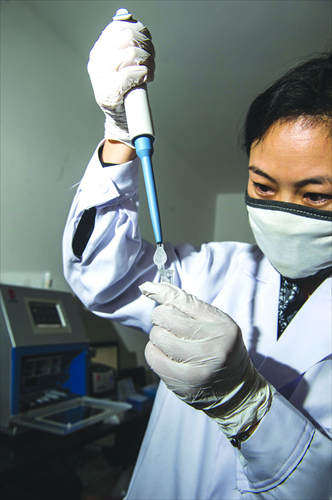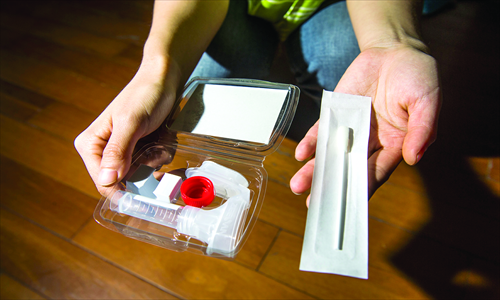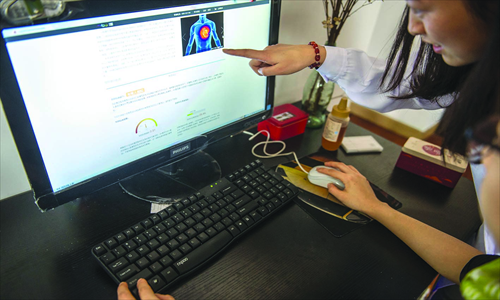Cracking genetic codes

A geneticist extracts a sample of saliva for testing. More Chinese companies are selling kits that test customers' DNA to reveal whether they are at risk of hereditary diseases. Photo: Li Hao/GT
When Kathy Wang (pseudonym), 30, suffered her third fall within five months in October, she began to worry something might be seriously wrong with her health.
"I was walking normally when my legs just gave in and I collapsed," she said of her most recent fall. "The first two falls weren't that serious, but the third one was severe."Wang went to the Affiliated Drum Tower Hospital at Nanjing University in Jiangsu Province to find out the cause of her mysterious falls. Using little more than a sample of her blood, doctors were able to analyze Wang's genetic makeup, diagnose her condition and put her on the path to treatment.
Genetic testing is used to identify changes in chromosomes, genes and proteins. Results of a genetic test can confirm or rule out a suspected genetic condition or help determine a person's chance of developing or passing on a genetic disorder.
It created international headlines in May when Hollywood star Angelina Jolie announced she had undergone a preventive double mastectomy after doctors found a mutated gene put her at high risk of breast cancer.
In China, genetic testing is being used for clinical purposes at a select number of hospitals and genetic testing companies operating commercial services. But uncertainties over its regulation and overall effectiveness in developing new drugs mean it still has a long way to go before it becomes a norm in national healthcare.

A DNA testing kit provided for customers to extract saliva samples. Photo: Li Hao/GT
Genetic testing by order
Wang first heard about genetic testing in 2011 when her mother complained of weakening legs and clumsiness. Wang's family took her to a local hospital where doctors recommended genetic tests be carried out.
Concerned about the stress such tests would put on Wang's elderly mother, doctors suggested Wang herself undergo them because she carried the same necessary genes. Results of the tests revealed she carried spinocerebellar ataxia (SCA), a hereditary neurological disease that progressively causes coordination to worsen and muscles to weaken.
At the time of her mother's hospitalization, Wang didn't show any symptoms of SCA. But when she started suffering from her falls, she returned to the hospital where doctors confirmed she had the degenerative disease.
"I believe in DNA testing. I know that it's a very accurate method of disease detection," Wang said.
Besides hospitals, some companies are also providing these services to help people have a better understanding of their bodies.
Hongtu Yuntian Technology Company began genetic testing in August last year. A few months later, it launched its service, dubbed 360 Gene, online.
Zhao Wei, the company's CEO, said customers can order a genetic test online and receive a testing kit in the mail. Packages vary in price, although a basic order costs 1,888 yuan ($310).
"A typical package includes a cotton swab, an introduction booklet and a tube. Customers first need to register online by entering the code on their tube before providing their sample," Zhao said.
After depositing a saliva sample in a tube, customers then mail it back to the company where a team of geneticists scrutinizes using a chip processed by a DNA decoding machine.
BGI, a Shenzhen-based nonprofit research institution, is another company that runs such tests. It provides support to scientists and contributes to biological research.
The company does a wide range of diagnostic tests, such genetic testing for deafness, the blood disorder thalassemia and personal genome sequencing and analysis, according to its website.



A geneticist scrutinizes saliva samples and analyzes a report about a customer's condition. Photos: Li Hao/GT
Individualizing treatment
Zhao said getting an original DNA sample from a subject isn't as important as analyzing the sample itself, even if it comes from a relative.
Customers genetically tested with 360 Gene are given reports on their results that offer a thorough analysis of their body and its functionality, Zhao said.
"Customers are given an electronic report with five categories of information: drug metabolism, individual genetic characteristics, dietary environment, carrier status for congenial diseases and genetic resistance against common diseases," she said.
The company offers customers readings on traits genes show, such as an individual's ability to absorb nutrients.
Folic acid (FA) is a common supplement doctors advise mothers-to-be to take during pregnancy, but not everyone can absorb it well. Zhao said genetic testing her company has carried out has determined four levels of FA absorbance.
"You need to know these kinds of characteristics about your body in order to make appropriate changes to your diet or medication," Zhao said. "If you learn through genetic testing that you can't absorb FA well, you might need to increase your dosage of it with your doctor's approval."
There's comforting news for people who struggle to lose weight no matter how much they exercise or diet, with Zhao claiming body shapes are largely determined by our DNA.
"Your genes decide where you will have extra fat," Zhao said. "Some people might not look fat, but they have high levels of blood lipids."
In hospitals, genetic testing is used to better prevent, diagnose and treat diseases, said Ye Qing, chief doctor of the pathology department at the Drum Tower Hospital.
"Genetic testing actually detects mutations in body cells, which are related to certain diseases," she said. "For example, the epidermal growth factor receptor (EGFR) gene can be the main reason for lung cancer when it mutates."
Ye confirmed that people found with certain gene mutations, like Jolie, are more likely to be at risk of certain diseases in the future. Fortunately, genetic testing can pave the way for earlier diagnosis and treatment, thus saving more lives.
After genes have been decoded, individual plans can also be developed based on DNA analyses.
Liu Baorui, chairman of the oncology department at the Drum Tower Hospital, said in the tumor treatment field drugs are being developed to target the characteristics of certain genes.
"For example, there's a type of medicine called TKI for non-small-cell lung cancer. The medicine works best if the EGFR gene mutation is detected in tutor tissues. In this case, its effectiveness can be as high as 80 percent. But if the gene doesn't mutate, then the effectiveness of the medicine can be as low as 1 percent."
Known as gene-targeted drugs, these medications are being used for patients with cancer of the lung, stomach or intestine, Liu said.
Doctors who devised treatment plans in the past usually relied on trial and error and isolated prescribed medication to one drug at a time.
Such treatment plans can be ineffective and slow, Ye said, noting it can mean the difference between life and death for a terminally ill patient.
Hurdles in healthcare
Even though a growing number of people are undergoing genetic testing in China, Ye said the age of diagnosing and treating all diseases based on patients' DNA is still a long way away.
"We started in 2008 and didn't pay much attention to this, but the doctors were supportive of this method because it has great clinical effects," she said.
"In 2009, we had about 100 patients [genetically tested]. Last year, we had more than 5,000 patients who chose this method."
Currently, the functions of all genes are not yet known by researchers and doctors, Ye said, adding that some mutations are being used for targeted clinical treatment even though they aren't yet fully understood.
"In the US, there is a test to determine a patient's entire body gene sequence that costs about $1,000. But even if we have the gene sequence, it can't be entirely understood," she said.
In the field of drug development, research is still being carried out.
Even though new genetic markers and targeted medicines are being regularly pioneered, Liu said it is difficult to formulate effective treatments because many drugs and genes aren't related.
Currently, such testing methods aren't subsidized by the government nor private health insurance firms, Liu said.
In 2007, the Ministry of Health published a catalogue on clinical exams that included genetic testing for certain diseases.
For hospitals to run such tests, they also need a TCR lab approved by the ministry.
Zhao noted regulation is loose for genetic testing in China, saying that there isn't sufficient government support to advance its development at a speedier pace.
Despite increasing public demand, genetic testing is still a fringe medical service. But the doctors are optimistic about its future in China.
"Today it's a type of avant-garde medical treatment, but tomorrow it could be the norm," Liu said.